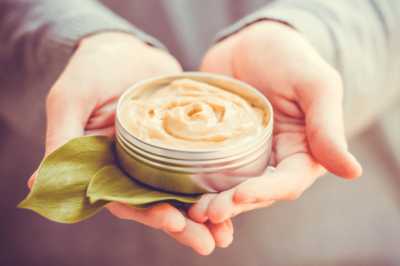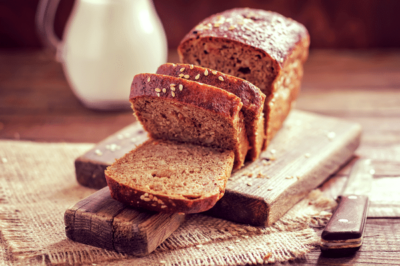Table of Contents[Hide][Show]
You’ve heard that going gluten-free might be good for you. Maybe you’ve already started a gluten-free diet, and you’re noticing some benefits, but you’re not really sure.
Despite all the information out there about gluten, it can be confusing to know just how it may be affecting you. Are you someone that is sensitive, and should be cutting back? If so, how might it help you?
If you’re still a little confused on the whole thing, this post is for you.
Why Go Gluten Free?
About one in 133 Americans has celiac disease, which means their bodies can’t process gluten correctly. If they continue to consume it, it can attack the small intestine, leading to damage that interferes with nutrient absorption. The only way for those with celiac to experience relief is to eliminate gluten.
Sometimes, however, even in people without celiac disease, a gluten intolerance or sensitivity may be present. If so, it can cause symptoms like digestive upset, headaches, joint pain, and even brain fog.
The last several years have seen a rise in both celiac disease and gluten sensitivity. Celiac is more than four times as common as it was 50 years ago. Part of that is because diagnostic testing has improved, but that doesn’t explain all of it.
Why is This Happening?
Scientists have a few theories.
How we process wheat and other gluten products, for example, has changed over the past several decades. We now use oxidizers, new methods of yeasting, and other chemical processes that may be changing how gluten reacts in the body. Some small studies have indicated that older processing methods eliminated more gluten than current methods do. Bacteria used to make dough rise were more likely to break down gluten and other proteins back then, making gluten easier to digest.
The wheat we use today has also undergone extensive hybridization as a crop. Scientists started crossbreeding wheat in the 1950s to make it hardier and better growing. Breeding was actually intended to improve “gluten strength” in some cases, creating greater loaf volume potential and increasing its ability to hold its shape during baking. These changes may have made the gluten interact differently with our immune systems, or the delicate balance of bacteria in our guts.
Most of today’s conventional wheat crops are also treated with insecticides, particularly glyphosate, the active ingredient in Roundup. In 2015, a new study suggested that glyphosate could be connected to the rise in celiac disease:
“Glyphosate residues are found in wheat due to the increasingly widespread practice of staging and desiccation of wheat right before harvest,” the researchers wrote. They went on to explain that the insecticide disrupts gut bacteria and enzymes, potentially impairing digestion.
We also consume more wheat on average than we did a century ago. It has gradually made its way into a number of our foods, far beyond breads and cereals. Now we find it in processed wheat products like pastas and baked goods, as well as in condiments, soups, and even candies.
Whatever may be causing the trouble between gluten and the human body, a lot of us are feeling the effects. One option is to choose only foods made with organic wheat, but it might be safer to just cut wheat out until farming practices change.
So for those of you considering making the switch and eliminating gluten, how can you expect our health to improve?
5 Ways Gluten-Free Can Improve Your Health
First, a word of caution.
Going gluten-free can make you vulnerable to a lot of products out there. Beware of processed foods shouting “gluten-free!” on their packaging. These products tend to be overly processed and higher in sugar and fat.
Don’t fall for the hype. Choose whole, natural foods instead.
After a few weeks on your new diet, you should experience the following health benefits. If not, it may be that gluten isn’t your problem. Check out our article on FODMAPs for other potential culprits.
1. Improved digestion.
This by far the most commonly experienced improvement in those choosing to go gluten free. Certainly those with celiac disease will experience less digestive upset. But those who are gluten intolerant or sensitive should also expect to feel much better in the belly.
Things like diarrhea, constipation, bloating, gas, cramping, and overall discomfort should lessen significantly as your intestines no longer have to deal with gluten. If you’re still having trouble, make sure you’ve completely eliminated gluten (it may be lurking in some foods like sauces and condiments).
2. Less pain.
In those who are sensitive to it, gluten can cause inflammation and pain throughout the body. Common symptoms include joint pain, muscle cramping, headaches, and even numbness in the legs and feet. You should feel much more comfortable after getting gluten out of your life.
3. Healthier skin.
The same way that gluten can cause inflammatory problems in the joints, it can also cause inflammation in the skin, leading to acne breakouts, eczema, psoriasis flare-ups, itching, hives, and rashes. If you suffered these pre-gluten-free, you could see your flare-ups lessen after about a month on your new diet.
At Annmarie Skin Care, we really value our customer’s skin health above everything else, so if you want to use products that are safe and non-toxic, check out our line of gluten-free skin care products.
4. Better mood.
A common sign of gluten sensitivity is brain fog or mood swings. The National Foundation for Celiac Awareness notes that people with gluten sensitivities report foggy thinking, ADHD-symptoms, and even depression—all of which are believed to be connected to the inflammatory compounds released when they eat gluten.
Many people who eliminate the protein find that they can think more clearly. Cutting back may also help improve your mood.
5. Increased energy.
Fatigue is another common symptom of celiac disease or gluten sensitivity. Gluten-induced fatigue can be a sign of internal inflammation, or in the case of those with celiac, a malabsorption of iron, which can cause extreme fatigue. It can also be a sign that the intestines are not absorbing nutrients from food in general as well as they should be.
Many people also just feel sluggish and sleepy after consuming gluten.
As you eliminate gluten from your diet, you should feel your energy levels returning to normal. When the inflammation subsides and the body soaks up nutrients more efficiently, it’s better able to produce the energy you need.
Have you experienced significant health benefits after going gluten-free…or not? Please share your story with our readers.
Sources:
Time – The Rise of Celiac Disease Still Stumps Scientists
The National Institute for Health – A Changing Environment and the Increasing Prevalence of Celiac Disease
CBS – Gluten-Free Diet Fad: Are Celiac Disease Rates Actually Rising?
Surgical Neurology International – Glyphosate, Pathways to Modern Diseases III: Manganese, Neurological Diseases, and Associated Pathologies
SF Gate – What Are the Benefits of Eating Gluten-Free?








I experienced inability to concentrate, irritability, headaches, bloating, stomach cramps, exhaustion, nausea, and even depression, before eliminating gluten. I didn’t feel myself anymore. I was always grumpy. Then I eliminated gluten and I am a whole different person.
Also I had cystic acne around my jawline that went away after eliminating.
Great article. I’m gluten-free but not celiac. It took me quite some time to figure out it was gluten causing my body aches and brain fog. I make my own long-fermented sourdough bread and other long-fermented foods. I can eat those with no problem…and they might actually be good for me! =D
I have another autoimmune disease called Sarcoidosis Sarcoidosis and Celiac are mentioned on the celiac website. Removing Gluten has eased my pain and made me brighter and I have more energy . Gluten is not all about Celiacs.
Great Post! I’m not gluten intolerant, but I went that way as a convenient way of excluding bread, cakes, burgers, Subway, pasta and a bunch of other stuff from my diet. And I don’t substitute for gluten-free variations of the same things, it’s all overpriced and tastes like shit usually. Just stick to real whole foods. The end result, way more home cooked meals, no convenience snacks or fast food and I lost a shitload of weight.
It has been 3 weeks since I changed from eating everything to eating Strictly Paleo. I have been completely committed to this process so I haven’t cheated at all. While I want to lose a lot of weight (130 lbs), it is not my only motivation for the change. I am 63 and I have been unwell for several years. Among other things I recently had both knees replaced and I have had fybromialgia for several years. I hoped that whole eating would get rid of the inflammation in my body. I’m still hoping it will. It’s only been 3 weeks but I’m a little discouraged because I’m in so much pain from fybromialgia that it’s hard to keep my perspective. Any ideas? I don’t know what to do.
Hi Jacqueline,
I’m sorry to hear that you’re having a hard time right now. It’s important that you find the diet and lifestyle that works for your body. I would suggest that you see a holistic practitioner because there is a lot here that you’re experiencing and they could be really instrumental in helping you find a healing solution!
Thanks for this article. It describes many of my symptoms and makes me think that I should go gluten free to see if that’s the issue.
One correction: bacteria are not what make bread dough rise. It’s yeast. When yeast consume sugar in the dough, they produce gas.
Hi friends,
I go gluten free more than a year now.i reduced my dairy consumption and using healthy oil for cooking ( coconut oil and ghee)it improved my health very much . Gluten is terrible for those who has digestive problems.
I appreciated your including this detail about the big change in how wheat is processed in most of our foods today:
“How we process wheat and other gluten products, for example, has changed over the past several decades. We now use oxidizers, new methods of yeasting, and other chemical processes that may be changing how gluten reacts in the body…. Bacteria used to make dough rise were more likely to break down gluten and other proteins back then, making gluten easier to digest.”
I’ve heard Michael Pollan say that if people who identified as gluten insensitive would eat a true sourdough bread, they would likely have no trouble. Even though I have eliminated gluten and added it back into by diet with no trouble, I’ve got a sourdough starter and can’t wait to start making our own bread!
Thank you for your post. And thanks for your theories about the changes in growing and processing in the USA. I avoid gluten in the USA. On a recent trip to Italy, I ate pasta and bread every day and NEVER had one single symptom. I asked someone in Sicily about this. They let me feel the flour they use. It is completely different than in the USA. Hmm, does this mean I need to move to Italy to get my bread fix? I did find a restaurant in the Denver area that imports their flour from southern Italy. Once again, no side effects when I ate their pizza.
Two years ago, I was very sick with a lot of varied and unusual symptoms, but no “stomach issues”. Upon being diagnosed with Hashimotos, the first thing my doctor suggested was Gluten Free, but also dairy, sugar, and grain free. I was overwhelmed with both the diagnosis and his suggestions. I thought my diet was fairly healthy and that gluten free people were a bunch of weirdos. That was one club I didnt want to join. Agreeing to try it for a month, it was really just to prove to my doctor that gluten was not an issue with me, after all I didnt have stomach issues. After a month off gluten, what happened was actually quite the opposite. I felt so much better that it was no problem to give up gluten for good. As a result two years later, the Hashimotos is almost in remission, with my TPO antibodies going from over 80 down to just 47, a mere two points above the normal range. Going gluten free, along with supplementing the nutrients and hormones my body was not able to make on its own has made a huge difference. Yes, I miss being able to eat bread and Subway Cookies, and my 84 year old mother’s fresh baked deserts, but the lifestyle change has been worth it. I feel so much better. I would not have believed it until I tried it.
Thanks for your comment Barbara. I also have HT and, after a year of supplements and one month, at the start of the year, off EVERTHING, I decided just to eliminate gluten. I have been really surprised by the results. It has impacted my energy levels, my brain fog, my skin, my digestion, all for the better. And its really easy. I haven’t missed bread at all. Okay, so I was tempted by a meat pie the other day, but I resisted! And the GF way has helped me make much ‘cleaner’ food choices.
Wow, what a great post! I have noticed a lot of improvements in me and especially in my son after going gluten free. I used to have a rash in my scalp and in my arms and it has cleared, my digestion is better and I no longer have any bloating after meals. But my son is the real success story, he had terrible brain fog and we went to many doctors and they even suspected that he had some minor cognitive disorder but we couldn´t quite believe it because he didn´t have any problems as a baby and until age of 4, the doctors were quite puzzled about this too. After changing to a gluten free diet the brain fog cleared and now he is very sharp and top of his class.
Thank you for the balanced, informative post about gluten sensitivities! As a naturopathic physician in practice for nearly 20 years, I appreciate how many of the the key issues surrounding gluten intolerance you touched on in your post. I agree that most people who are intolerant will see significant improvement within 4-8weeks after avoidance. i highly recommend Grain Brain by David Permutter, MD for more scientific information on reasons for the gluten intolerance epidemic. I have been gluten free for over 6 years & it has been life altering. Thanks for your wonderful products & educational posts!
Thank you for sharing this post! And especially for pointing out the importance of eating real food….not buying gluten free crap. My skin, energy level, digestion and mood have all improved by cutting out gluten and most dairy (I’m ok with some butter or ghee from time to time.) I never fell into the trap of buying gluten free bread, bagels, etc. I have been doing this for over five years and have never felt better. I eat tons of veggies, fruits, healthy fats, and high quality protein. I document a lot of this on my blog.
Glyphosate, or Round-up, is not an insecticide. It is a broad spectrum herbicide.